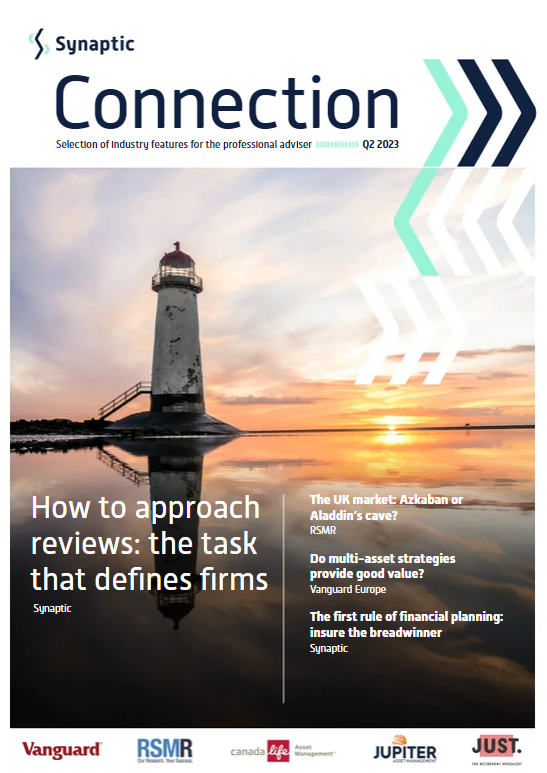In this edition...
- How to approach reviews: the task that defines firms Eric Armstrong, Client Director - Synaptic
- The UK market: Azkaban or Aladdin’s cave? Katie Poulson, Marketing Manager - RSMR
- Do multi-asset strategies provide good value? Andreas Zingg, Head of multi-asset solutions - Vanguard Europe
- Introducing ebi Jonathan Griffiths , CFA Investment Product Manager - ebi
- Generating income and capital growth – never the two shall meet? Jordan Sriharan , Fund Manager, Multi-Asset - Canada Life Asset Management
- The Merlin approach to ESG George Fox , Investment Manager, Independent Funds - Jupiter
- Protecting the vulnerable: navigating the evolving regulatory landscape in a post-pandemic world ,
- Optimise retirement income portfolios with a new asset class Yannis Katsis, Business Development Director - Just
- The first rule of financial planning: insure the breadwinner ,
 The UK isn’t alone when it comes to the battle with high inflation and slowing economic growth, but it looks like we’ve been harder hit than most as, according to the International Monetary Fund (IMF), we’re set to be one of the worst performing major economies in the world this year. The IMF predicts that the UK economy's performance in 2023 will limp over the line in last place out of the G20 - the 20 largest economies - and this includes Russia, a country weakened by sanctions. With the IMF suggesting that the UK economy will shrink by 0.3% during 2023 and then grow by 1% next year, the outlook is far from rosy, but at least the latest prediction is slightly more upbeat than its previous expectation of a 0.6% contraction.
The UK isn’t alone when it comes to the battle with high inflation and slowing economic growth, but it looks like we’ve been harder hit than most as, according to the International Monetary Fund (IMF), we’re set to be one of the worst performing major economies in the world this year. The IMF predicts that the UK economy's performance in 2023 will limp over the line in last place out of the G20 - the 20 largest economies - and this includes Russia, a country weakened by sanctions. With the IMF suggesting that the UK economy will shrink by 0.3% during 2023 and then grow by 1% next year, the outlook is far from rosy, but at least the latest prediction is slightly more upbeat than its previous expectation of a 0.6% contraction.
What else has contributed to this rather gloomy picture? Concerns over the wider impact of Brexit and the political instability experienced over 2021 have all added to the negative sentiment towards the UK from potential investors. According to data from Calastone, the largest global funds network, UK investors withdrew a staggering £733m out of UK equity funds in March this year, marking the 22nd consecutive month of outflows for the asset class. In total, UK equities have suffered outflows of £12.1bn since December 2020.
What’s the result of all this negativity? The UK is now basically one of the cheapest markets in the developed world. The small and mid-cap parts of the UK equity market have really suffered as their earnings are more domestically focussed, unlike their larger counterparts where a significant portion of their revenues is generated from overseas. Lots of UK companies are currently trading at a significant discount compared to their peers abroad and the difference is even more marked when it comes to US based businesses. Many investors and asset allocators are avoiding the UK market like the plague, but the flip side is that cheap valuations are attracting private equity groups eager to take advantage of weak share prices to acquire quality UK business at discounted rates.
What’s been happening with private equity bids? In 2021 a whole host of UK listed companies were taken over, including Wm Morrison, John Laing, Aggreko and St Modwen Properties, but in 2022 investor sentiment was shaken causing a significant lull. The war in Ukraine, spiralling energy costs, inflation, rising interest rates and political uncertainty in the UK all played a part, making private equity bids dry up, but we are starting to see the buds of renewed interest.
What’s the state of play now? The oil services group John Wood and Hyve, the exhibitions organiser, were both under the acquisition microscope in the first quarter of the year. Network International, a payment processor in the Gulf and Africa, has received a preliminary and conditional approach from CVC and Francisco Partners and Dechra Pharmaceuticals, the pets drug group, announced an all-cash bid of £4.6billion from EQT, the Swedish private equity firm.
"Whatever your sentiment, UK listed companies remain an integral part of asset allocations for UK based portfolio managers and multi-asset strategies."
What’s caused market movement when it comes to new acquisitions? No-one can deny that the future for UK companies is unlikely to be a bed of roses, but prospects are looking brighter than a few months ago. The outlook is more positive, and valuations remain depressed, creating the perfect environment for investors considering new acquisitions. Big names such as ITV, WHSmith, Dunelm, Pets at Home and Softcat are all being scrutinised as potential targets.
Some investors hope to make an easy buck by buying into companies when they believe a takeover is on the cards, and in the short-term they may well reap the benefits. A potential takeover can be lucrative for shareholders who bought in at the right price as the offer is generally at a significant premium to the prevailing share price (albeit the offer price is likely to still be lower than their long-term average), but the downside is that there will be fewer opportunities to reinvest that cash in the longer term.
With the current state of play, what’s the location of choice for listing private companies? UK companies are increasingly choosing the US over London for their initial flotation - yet another blow to the London Stock Exchange. And to make matters worse, some established names on the London market are mulling over the idea of leaving the UK for a US listing in the hope that the stock market valuation in the US will better reflect the true underlying value of their businesses. This would further reduce the opportunity set for UK investing and would damage the reputation of London as a major financial centre. Law firms and financial companies based in the UK will also feel the brunt as they would miss out on the lucrative fees involved in bringing a company to market and they’d be affected by the drop off in revenues for professional advice and expertise required by companies already listed.
Whatever your sentiment, UK listed companies remain an integral part of asset allocations for UK based portfolio managers and multi-asset strategies. Given the quantities of cash many private equity firms are holding and their appetite to invest, the level of takeover activity is likely to heat up over the next few years. Navigating the rapidly dwindling universe of UK stocks will be no mean feat so selecting the most capable and agile managers, confident in generating returns, is a strategy worth investing in.
Find out more
For more economic and market updates from RSMR and a whole host of impartial, forward-looking, qualitative investment research content, visit www.rsmr.co.uk
Sign up for updates
Keep up to speed with everything you need to know each quarter, by email or post.


